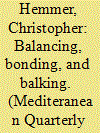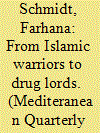|
|
|
Sort Order |
|
|
|
Items / Page
|
|
|
|
|
|
|
| Srl | Item |
| 1 |
ID:
097266


|
|
|
|
|
| Publication |
2010.
|
| Summary/Abstract |
The increasing resources, albeit largely financial, that the European Union has committed to the Israeli-Palestinian relationship has led to increasing calls for the EU to take a greater political role in the peace process. In this essay the potential role of the EU in the Israeli-Palestinian conflict is examined in relation to that of the United States. For the EU to play a more influential role in the peace process, neither a pure balancing nor a pure bonding strategy is likely to work. Instead, the most promising strategy for the EU would be a bonding strategy combined with a threat to balk, to simply withhold support from US initiatives if Europe's views are not taken into account.
|
|
|
|
|
|
|
|
|
|
|
|
|
|
|
|
| 2 |
ID:
097263


|
|
|
|
|
| Publication |
2010.
|
| Summary/Abstract |
The absence of a universally accepted definition of minority and standardized mechanisms for minority protection presents challenges during the European Union (EU) accession process. The differences between definitions used by European policy makers and those used in candidate countries are evident in Turkey's journey to the EU. Cultural identity boundaries are dynamic, and emphasizing the protection of particular minority groups can be regarded as a minority-forging policy that places at risk the successful implementation of minority protection in the candidate country.
|
|
|
|
|
|
|
|
|
|
|
|
|
|
|
|
| 3 |
ID:
097261


|
|
|
|
|
| Publication |
2010.
|
| Summary/Abstract |
Euro-Atlantic" as a political power brand name was employed possibly for the first time in a 1985 speech by Bettino Craxi, then president of the European Council, when he spoke about "Italy's Euro-Atlantic role." Its political usage was codified in the label Euro-Atlantic Partnership Council (EAPC), a group formed in 1997 and which now numbers fifty "partner" governments. EAPC is the successor to the North Atlantic Cooperation Council. (The NACC was created as an adjunct to NATO six years earlier in the first flush of post-Cold War Europe.) Among EAPC partners are not only eleven far-flung (and non-Atlantic-riparian) governments of the former Soviet Union-from Armenia to Uzbekistan-but also the six republics of the former Yugoslavia. Russia itself is listed among the partners, although its leaders remain highly suspicious of the NATO parent.
|
|
|
|
|
|
|
|
|
|
|
|
|
|
|
|
| 4 |
ID:
097270


|
|
|
|
|
| Publication |
2010.
|
| Summary/Abstract |
Parliamentarization is an under-studied dimension of Euro-Mediterranean relations. A preliminary assessment of the Euro-Mediterranean Parliamentary Assembly shows that the parliamentary process is not unique to the Mediterranean. The origins, aims, and objectives of the EMPA are presented, as are its structure and functions during its first four years of existence. Despite many weaknesses and limitations, the EMPA can play an important role in Euro-Mediterranean relations, but in order for it to do so, both its structures and functions need to be strengthened.
|
|
|
|
|
|
|
|
|
|
|
|
|
|
|
|
| 5 |
ID:
097268


|
|
|
|
|
| Publication |
2010.
|
| Summary/Abstract |
The Taliban of today bears little resemblance to the original Taliban of the 1990s. Everyone from fighters loyal to various warlords to criminals involved in kidnapping and racketeering label themselves Taliban. This makes sorting out exactly who is who a difficult task. Nevertheless, one thing is abundantly clear: the active participation of the Taliban has aided and abetted opium cultivation on a scale unmatched by anything Afghanistan has seen in the past. Papaver soniferum, or poppy, is the lifeblood of the Taliban insurgency. Once the Taliban's financial arteries linked to the poppy are cut off, the insurgency will experience a major organizational blow, unless it morphs into an entirely new animal.
|
|
|
|
|
|
|
|
|
|
|
|
|
|
|
|
| 6 |
ID:
097269


|
|
|
|
|
| Publication |
2010.
|
| Summary/Abstract |
In his Clash of Civilizations, Samuel Huntington specifically predicts a rapprochement in Greek-Russian relations on account of common civilizational factors. The explanatory validity of this claim can be assessed by examining the extent and nature of the recently improved bilateral relations between Athens and Moscow. An analysis is presented of the Burgas-Alexandroupolis oil pipeline deal, Greece's participation in the South Stream gas pipeline project, its purchase of Russian tanks, and its more recent strategy of taking a step back from its overall excellent relations with Russia. Upon further scrutiny, it is concluded that cultural affinities do not determine or even greatly influence contemporary Greek foreign policy. Rather, Athens' various decisions are better explained on the basis of more traditional realist concepts.
|
|
|
|
|
|
|
|
|
|
|
|
|
|
|
|
| 7 |
ID:
097259


|
|
|
|
|
| Publication |
2010.
|
| Summary/Abstract |
US intelligence activities have changed in recent years because of changing global political conditions. Using sophisticated technologies, intelligence agencies now conduct surveillance of a wide variety of organizations and an enormous number of people, including many US citizens. This has generated a vast amount of data that these agencies have not been able to use productively, in spite of the expenditure of many billions of dollars, mostly with private firms. Some 70 percent of the approximately $75 billion spent on intelligence annually is spent on these firms. The author discusses a number of serious problems with these developments.
|
|
|
|
|
|
|
|
|
|
|
|
|
|
|
|
|
|
|
|
|